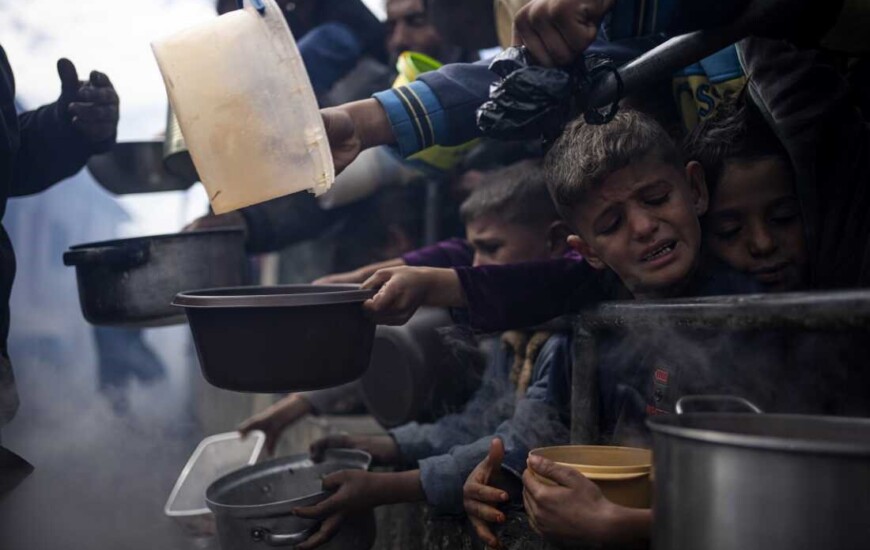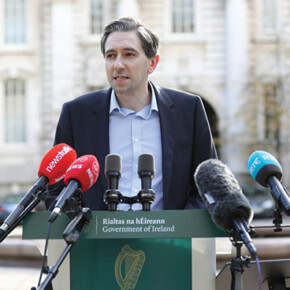Families in Gaza say children are dying of hunger
Padraig Conlon 18 Aug 2025
Israel is deliberately starving Palestinians in the occupied Gaza Strip, Amnesty International has said, accusing Israeli authorities of weaponising food, water and medicine to collectively punish civilians.
In its latest investigation Amnesty documented harrowing testimony from displaced families and medical workers that reveals children dying of hunger, mothers unable to feed their babies, and older people begging for death rather than being a burden.
Amnesty said starvation in Gaza is not an accidental by-product of war but a systematic campaign.
“To even begin reversing the devastating consequences of Israel’s inhumane policies and actions, which have made mass starvation a grim reality in Gaza, there must be an immediate, unconditional lifting of the blockade and a sustained ceasefire,” said Erika Guevara Rosas, the organisation’s Senior Director for Research, Advocacy, Policy and Campaigns.
She said hunger and disease are being used to torment an entire population with impunity.
S, a nurse displaced from Jabalia to Sheikh Radwan camp in Gaza City, described the daily struggle to keep her two-year-old boy and seven-month-old girl alive.
“By the end of April my breast milk was almost gone. I would try for hours to feed my baby but milk would just not come out,” she said.
Her daughter weighs what a four-month-old should. Infant formula, when it can be found, costs around 270 shekels, about €79, for a three-day supply.
“Even at that price it is often not available. My children fall asleep weeping out of sheer hunger.”
She said the family’s single daily meal, when available, consists of lentils or eggplants boiled in water. “I give it to the toddler. I stay hungry.”
When the community kitchen in the camp stopped serving food for three days, she had nothing to give them but water.
Her husband was injured while trying to get aid near the Zikim crossing.
“I begged him not to go again. My son is so weak from hunger he walks and falls. I feel like I failed as a mother; your children’s hunger makes you feel like you are a bad mother.”
Hadeel, 28, is four months pregnant and already has two children.
She said, “I barely feel the baby move inside me. I fear miscarriage, but I also think about what my hunger is doing to the baby’s health, its weight, whether it will have birth defects.
“Even if it is born healthy, what life awaits it — displacement, bombs, tents?”
She described the guilt of being pregnant in such conditions, knowing she cannot feed herself properly. “I panic just thinking about giving birth here. In my previous pregnancies I had vitamins, medical tests, UNRWA care. Now there is nothing.”
Amnesty noted that of 747 pregnant and breastfeeding women screened by Save the Children in July, 323 — 43 percent — were malnourished.
Older people interviewed said they felt both hunger and despair. Abu Alaa, 62, displaced from Jabalia, said, “I often survive on one bowl of lentil soup for the whole day.
“Bread is given out once a week. I have not tasted fruit for months. I can tolerate the hunger, but children cannot.”
Nahed, 66, spoke about the desperation at food distributions.
“I had to go because I have nobody to look after me. I saw people carrying bags of flour stained with the blood of those who had just been shot.
“Even people I knew were almost unrecognisable. Hunger and war have denied people their humanity.
“It has changed Gaza completely. It has changed our values.”
Aziza, 75, said displacement has left her feeling like a burden.
“I wish I could die. When we were displaced they had to push me on a wheelchair.
“The toilet queues are so long. I need adult diapers but they are too expensive.
“I need medicine for diabetes, blood pressure and my heart. I have had to take expired medicine.
“The young children are the ones who deserve to live, my grandchildren. I feel like I am a burden on them, on my son.”
Doctors told Amnesty that starvation is fuelling a health disaster.
A doctor at al-Shifa Hospital in Gaza City said, “What we see is multi-layered intertwined destruction. Starvation, destroyed healthcare, displacement, unsanitary conditions. Many patients would be living reasonable lives if not for this combination.”
He described wounds that fail to heal because the patients’ bodies are too weak, diabetics unable to control their illness without proper food, and transplant patients relapsing because they drink polluted water and eat whatever scraps are available.
Doctors also reported a rise in infectious diseases and in Guillain-Barré Syndrome, a rare neurological illness that can cause paralysis.
“GBS is spreading because of infections caused by dirty water,” the doctor said. “We cannot treat it because the required medication, IVIG, is not allowed in.
“Four people have already died, including two children.”
The Ministry of Health in Gaza said 110 children have already died from malnutrition-related complications.
The Nutrition Cluster recorded nearly 13,000 children admitted for treatment of acute malnutrition in July, the highest figure since the war began. At least 2,800 of them had severe acute malnutrition.
The UN’s Integrated Food Security Phase Classification has already said famine thresholds have been reached in most of Gaza.
Amnesty’s investigation also found that food production has been destroyed.
A UN assessment showed 86 percent of permanent crop fields have been devastated. Poultry and livestock farms have been razed, and fishermen are confined to a small area of sea near the port, risking shelling or arrest.
A kilogram of tomatoes now costs about 80 shekels, or €23, a twentyfold increase on pre-war prices.
Even when Israel allows small amounts of goods through selected merchants, prices remain ten times higher than before October 2023.
Humanitarian workers said their requests to bring in essential supplies, including antibiotics, were repeatedly rejected. Amnesty says Israel has also introduced new rules that would block international NGOs entirely from operating in Gaza. Guevara Rosas said, “Most families in Gaza are beyond breaking point.
“They have already exhausted whatever scant resources they had and are entirely dependent on humanitarian aid. Blocking humanitarian groups from helping cuts off their only lifeline.”
One displaced man told Amnesty he has already been forced to move 14 times.
“I don’t have the power to flee anymore. I don’t have the money to transport my two children with disabilities.
“My muscles ache. I’m too exhausted to walk, let alone carry them. If they attack the city, we will just sit here awaiting our death.”
Amnesty insists that as the occupying power, Israel has a legal duty to protect civilians and provide them with food and medicine.
“Instead, it accuses Israel of deliberately using starvation as a weapon of war.
“The world cannot continue to pat Israel on the shoulder for trickling in aid and viewing these cosmetic measures as a sufficient response to its calculated destruction of the life of Palestinians in Gaza,” Guevara Rosas said.
She called on states to suspend all arms transfers, impose sanctions and end any engagement with Israeli entities that contribute to what she described as genocide.
In Dublin, Amnesty Ireland’s executive director Stephen Bowen urged the Irish government to act decisively.
“Ireland has shown principled leadership before and must now do so again if it is not to become complicit in genocide. At a minimum, and bearing in mind the special privileges Israel still enjoys under the EU Association Agreement, Ireland must act as if it were suspended.
“There can be no special privileges while Israel starves Palestinians to death,” he said. Bowen added, “Ireland knows how to stand up to bullying from Israel and those who continue to back and arm it. Ireland must act now with determination and courage. And with courage comes hope.”
Across Gaza, the same scenes repeat: children crying for food, mothers unable to feed them, the elderly enduring without medicine, hospitals overwhelmed.
A doctor at al-Shifa said every case he sees is now shaped by hunger. “Starvation, disease, displacement, collapsing hospitals, all intertwined.
“The people of Gaza are being pushed beyond the point of survival.”
Amnesty’s conclusion is stark. Unless the blockade is lifted, humanitarian aid allowed in and military operations halted, more children will die of starvation, more mothers will see their infants waste away, and more elderly people will conclude they are a burden not worth saving. Starvation, the organisation says, is being used as a weapon of war, and the world is letting it happen.











